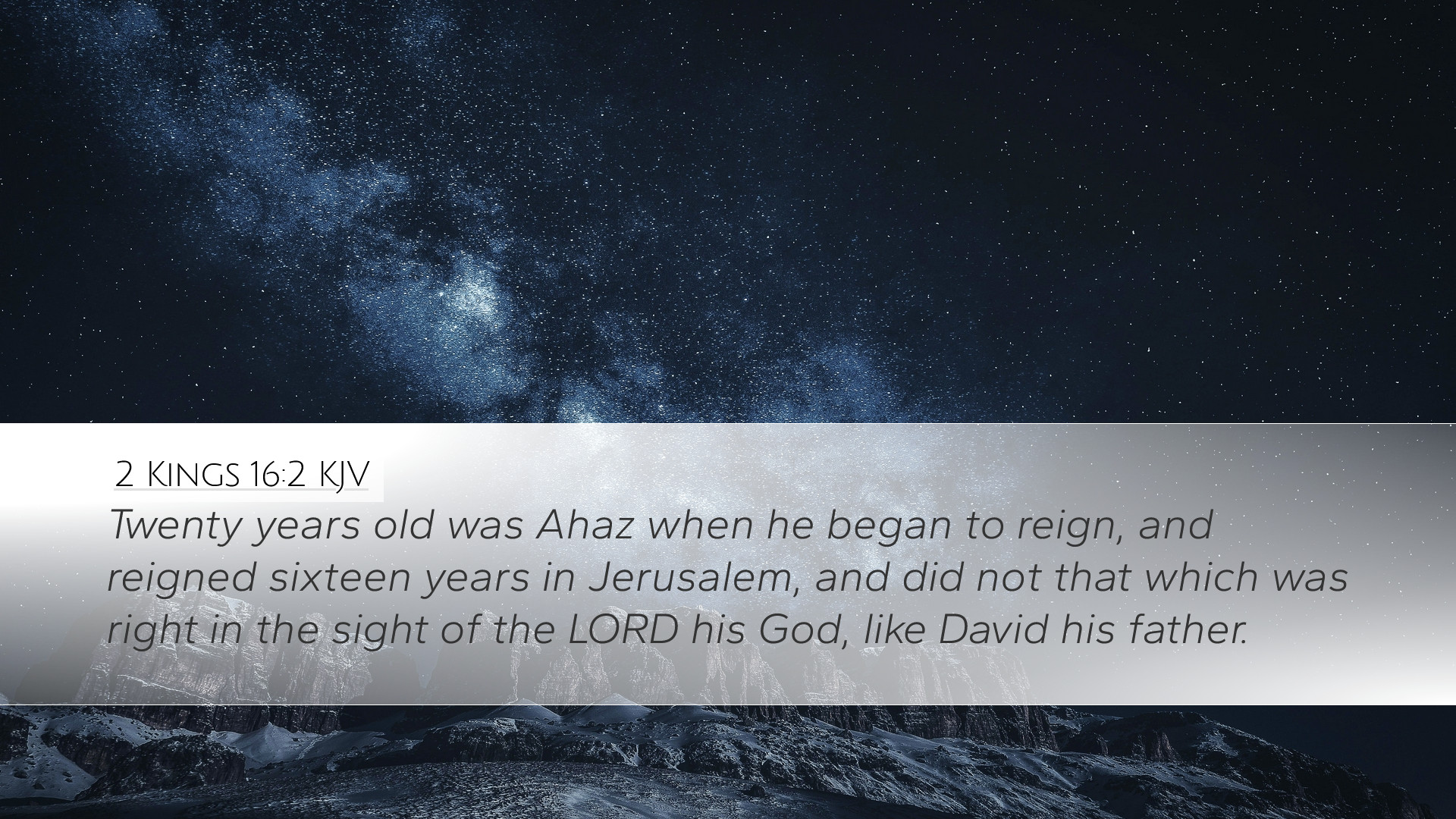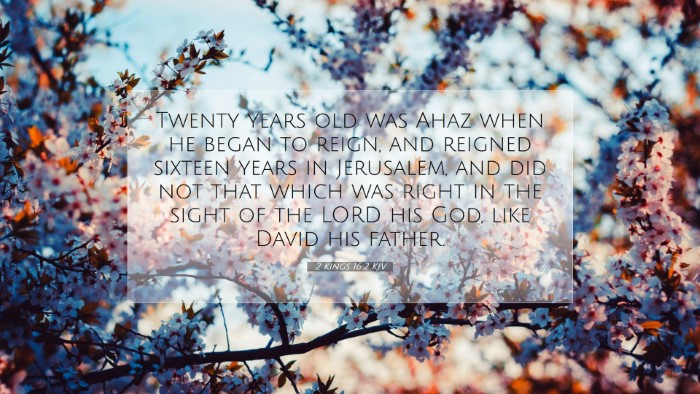Old Testament
Genesis Exodus Leviticus Numbers Deuteronomy Joshua Judges Ruth 1 Samuel 2 Samuel 1 Kings 2 Kings 1 Chronicles 2 Chronicles Ezra Nehemiah Esther Job Psalms Proverbs Ecclesiastes Song of Solomon Isaiah Jeremiah Lamentations Ezekiel Daniel Hosea Joel Amos Obadiah Jonah Micah Nahum Habakkuk Zephaniah Haggai Zechariah Malachi2 Kings 16:2
2 Kings 16:2 KJV
Twenty years old was Ahaz when he began to reign, and reigned sixteen years in Jerusalem, and did not that which was right in the sight of the LORD his God, like David his father.
2 Kings 16:2 Bible Commentary
Commentary on 2 Kings 16:2
Verse: "Twenty years old was Ahaz when he began to reign, and he reigned sixteen years in Jerusalem, and did not that which was right in the sight of the LORD his God, like David his father." (2 Kings 16:2, KJV)
Introduction
This verse introduces King Ahaz of Judah, a figure whose reign is marked by significant turmoil and spiritual decline. His age at ascension to the throne and the moral evaluation of his reign invite deeper scrutiny into the implications of leadership and obedience to God. The insights drawn from the great Biblical commentators elucidate the complexities of Ahaz's character and reign.
Contextual Background
The historical context surrounding 2 Kings 16 is crucial for understanding the events that transpired during Ahaz's reign. He took leadership during a time when the kingdom of Judah was facing external threats and internal crises. Commentators like Matthew Henry stress the importance of leadership in the spiritual life of a nation, noting that the king's fidelity or infidelity to God significantly impacts the people.
Age and Ascension
At the tender age of twenty, Ahaz ascended the throne, a point emphasized by both Albert Barnes and Adam Clarke. Young leadership can often sway between idealism and naivety, and in Ahaz's case, his youth may have been compounded by a lack of mature counsel and wisdom. His age is noted not simply as a statistic; it reflects the vulnerability of Judah during his rule.
Comparative Evaluation
The textual comparison to David serves to underscore Ahaz's failure. While David, described as a man after God's own heart, reflected faithfulness, Ahaz's actions diverged starkly. This phrase serves as a profound theological marker, indicating that true leadership is not merely about maintaining power but about service to God.
Character Study of Ahaz
Ahaz's character is marked by significant deficiencies. Commentators note his impulsiveness and lack of spiritual discernment, which resulted in disastrous decisions for Judah. His inclination towards idolatry and political alliances with foreign nations illustrates a profound disconnection from God, representing a cautionary tale for contemporary leaders.
Spiritual Downfall
Henry provides a thorough analysis of Ahaz's specific failures, particularly his willingness to adopt the worship practices of neighboring nations, which ultimately led to spiritual corruption. He represents a king who strayed into paganism, emphasizing the dangers of compromise in faith practice.
Theological Implications
In the context of spiritual leadership, Ahaz's reign serves as a reminder of the consequences that arise when leaders refuse to align themselves with God's will. Such disobedience reflects not just on the individual but has broader implications for the nation at large, as observed by Clarke.
Conclusion
Ahaz's brief reign encapsulates a significant lesson in the annals of biblical history. Leaders are called to avoid the snares of corruption, idolatry, and ungodly alliances. The lesson for contemporary leaders—pastors, theologians, and students of Scripture—is clear: faithfulness to God is paramount. The legacy of Ahaz serves as an enduring reminder of the importance of aligning one's heart and decisions with divine will.
Reflection Questions
- What can be learned from Ahaz's leadership style and its impact on the kingdom of Judah?
- In what ways can modern leaders ensure that their actions align with Scriptural principles?
- How does the example of Ahaz inform our understanding of spiritual accountability?


